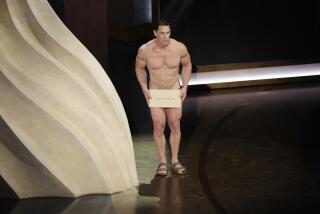Oscars 2013: How Seth MacFarlane’s sexist jokes hurt women

- Share via
Wait, so the academy fired Brett Ratner from his gig as Oscars producer for making sexist and crude comments, but then, as Vulture’s Kyle Buchanan smartly points out, allowed host Seth MacFarlane to make “that kind of un-PC humor the cornerstone of his whole act.”
BuzzFeed has rounded up the nine most sexist moments of Sunday’s Oscars, including MacFarlane’s sophomoric boob song. And New York Magazine transcribed the most offensive barbs, in case you want to relive the horror.
Opinionators have also joined the conversation, analyzing Sunday’s most offensive moments and discussing why jokes that belittle and objectify women matter.
FULL COVERAGE: Oscars 2013 | Winners
Here are three thoughtful takes.
In a commentary piece for Vulture, Margaret Lyons argues:
It’s frustrating enough to know that 77 percent of Academy voters are male. Or to watch 30 men and 9 women collect awards last night. But MacFarlane’s boob song, the needless sexualization of a little girl, and the relentless commentary about how women look reinforced, over and over, that women somehow don’t belong. They matter only insofar as they are beautiful or naked, or preferably both. This wasn’t an awards ceremony so much as a black-tie celebration of the straight white male gaze.
The New Yorker’s Amy Davidson also shares her disgust and warns:
“Django Unchained” [MacFarlane] said, was “the story of a man fighting to get back his woman, who has been subjected to unthinkable violence. Or as Chris Brown and Rihanna call it, a date movie.” Relationships are complicated, and it can take a woman more than one attempt to leave an abuser. But if any woman who goes back is told that she has forfeited sympathy and can be written off with mockery -- that the whole thing is now an amusing spectacle -- then we’ll end up with more dead women. There are surely better things to joke about.
And the Atlantic’s Spencer Kornhaber explains what’s at stake:
Humor, after all, can be an incredible weapon for social progress, but it can also be regressive: The more we pass off old stereotypes, rooted in hate, as normal -- as MacFarlane did again and again last night -- the longer those stereotypes, and their ability to harm people, will be in place
ALSO:
Hollywood’s outsiders come inside
Oscars 2013: Seth MacFarlane’s seven worst jokes
Oscars show review: Despite Adele, Michelle Obama, telecast is dull
Follow Alexandra Le Tellier on Twitter @alexletellier
More to Read
A cure for the common opinion
Get thought-provoking perspectives with our weekly newsletter.
You may occasionally receive promotional content from the Los Angeles Times.










